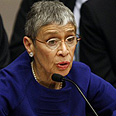
Israeli UN envoy: China 'a mystery' on Iran sanctions
Ambassador Shalev says if Security Council won't agree on new sanctions for Tehran, individual world powers will have to team up outside Council to punish Iran economically
China's position on toughened nuclear sanctions against Iran remains a "mystery," Israel's UN envoy said Tuesday, and doubted the Security Council would agree new punishments for Tehran this month.
Ambassador Gabriela Shalev also said that should efforts fail to frame a unified range of United Nations sanctions, it would be up to individual world powers to team up outside the Council to punish Iran economically.
And, following Israeli Prime Minister Benjamin Netanyahu's visit to Moscow, Shalev said that it was clear Russia had dropped its earlier reluctance to impose more sanctions on Iran to punish its nuclear drive.
"I know that the Russians have turned their position," Shalev told a small group of reporters.
"I know that the Russians now agree that there must be some kind of limit on the engagement," she said, referring to Iran's refusal to agree to a UN-backed deal to end the standoff over its nuclear program.
"China is a mystery."
Shalev said she had hoped that new sanctions would be agreed against Iran by the end of this month, when France hands over the presidency of the Security Council to Gabon, but that now looked unlikely.
"My feeling is that we will not be able to achieve this resolution regarding sanctions within the month of February," Shalev said, adding that the position of Gabon on the issue was not clear.
President Barack Obama's national security advisor James Jones told Fox News Sunday that Washington was pushing for very tough new sanctions against Iran "this month."
Earlier Tuesday, the United States, Russia and France said that Iran's recent escalation of its uranium enrichment further undermines international trust in its nuclear drive.
The three powers sent a letter to the International Atomic Energy Agency (IAEA) expressing new concern about Iran's actions and signalling further pressure on the Islamic state.
A Kremlin spokeswoman meanwhile said that Moscow did not rule out new sanctions against Iran should Tehran fail to fulfil its obligations to throw open its nuclear program to international scrutiny.
China is yet to reveal its hand. On Thursday, with Beijing under intense pressure to sign off on the tightened sanctions regime, a foreign ministry spokesman called for more "diplomatic efforts" to resolve the crisis.
The West argues that Iran's nuclear program is intended to produce an atomic bomb -- a charge Tehran denies.










